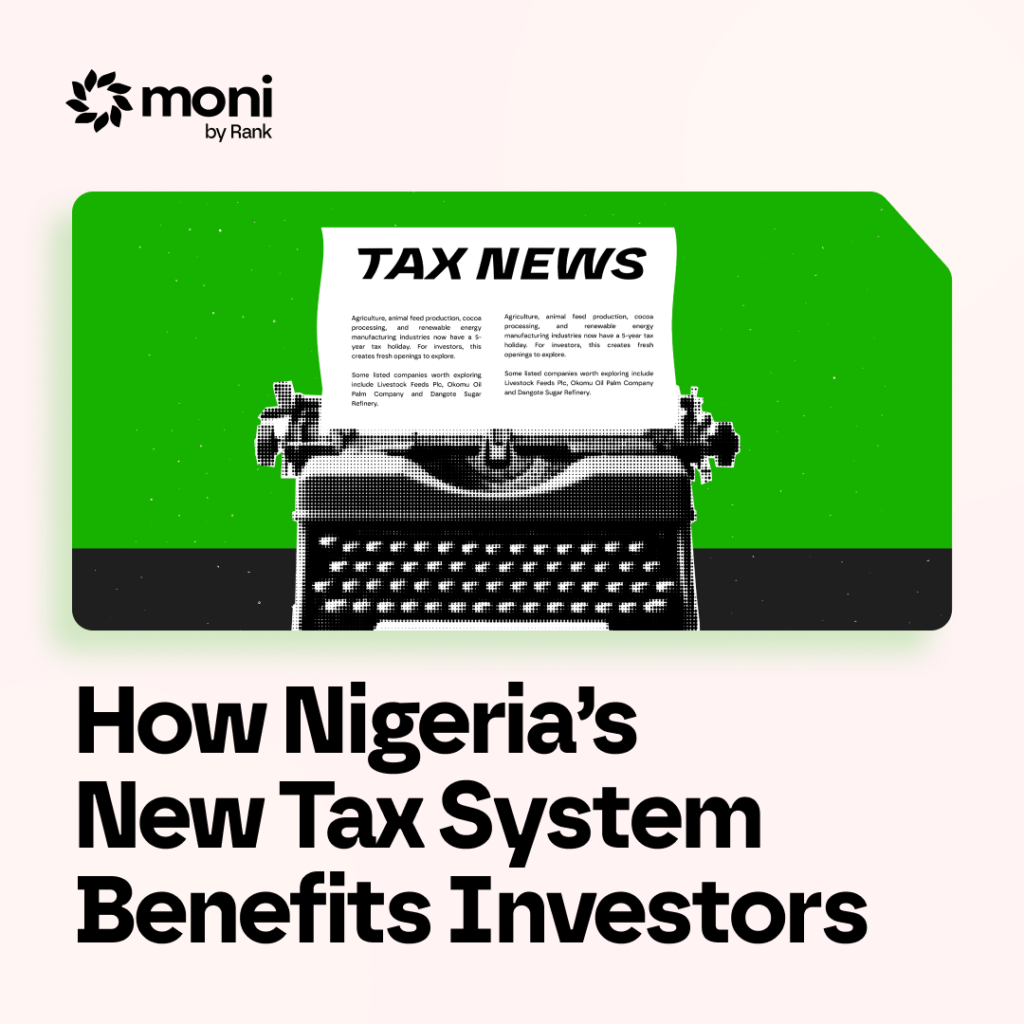
Big tax changes are coming to Nigeria in 2026, and if you’re an investor or avidly follow the stock market, this is a shift worth paying attention to. The recently passed tax reforms are designed to increase government revenue and simplify the tax environment, but they also have the potential to reshape investor confidence and business performance especially for companies listed on the Nigerian Stock Exchange (NGX). So, what’s changing and what should you do with that knowledge?
Simpler Taxes, Higher Profits
One of the core goals of Nigeria’s 2026 tax reforms is to simplify the system; fewer overlapping taxes, clearer rules, and more transparency. For businesses, this shift is significant because it means less time spent untangling confusing levies and more room to focus on what matters: growth and profitability.
For example, under the new law, several scattered levies have been merged into a single Development Levy. Nigerian companies, excluding small businesses, will now pay this levy at 4% of their assessable profits (i.e. profits before deducting tax depreciation and losses). This new Development Levy consolidates previously separate charges like the Tertiary Education Tax (TET), Information Technology Levy, NASENI Levy, and the Police Trust Fund Levy. By rolling these into one, the system becomes more predictable and easier to manage for companies.
There’s also a move to close tax loopholes. Previously, capital gains were taxed at 10%, which allowed some companies to shift profits into lower-tax categories. Now, the Capital Gains Tax rate has been increased from 10% to 30% for companies, matching the standard Companies Income Tax rate. This eliminates the gap and simplifies tax planning— no more playing games with classifications just to reduce tax bills.
While these changes mean some businesses will pay more in specific areas, the overall structure is much clearer and easier to comply with. Less back-and-forth with tax authorities, fewer filings, and reduced legal ambiguity can all help lower compliance costs in the long run. And for investors, a cleaner, more transparent system often signals better financial discipline and stronger performance ahead.
Five-Year Tax Holidays for Key Industries
The reform also introduces five-year tax holidays for businesses in key sectors: agriculture, animal feed production, cocoa processing, and renewable energy manufacturing. For investors, this creates fresh openings to explore. Some listed companies already active in these areas include Livestock Feeds Plc, FTN Cocoa Processors, Presco Plc, Okomu Oil Palm Company, and Dangote Sugar Refinery. Many of these stocks are still undervalued, but probably not for long. If you’re looking for potential value plays that could benefit from improved margins and stronger earnings, this is a space worth watching closely.
Capital Gains Tax Exemption Will Encourage More Trading
Under Section 34 of the new law, profits from selling shares will be tax-free if the total gain is under ₦150 million or if those profits are reinvested in shares within the same year. This is good news if you’re someone who’s previously hesitated to trade frequently because of tax concerns. With this exemption in place, you can buy and sell more freely without worrying about losing a portion of your profits to the taxman. It’s also likely to increase activity on the NGX overall, making the market more liquid and responsive.
Foreign Investors Could Return in Force
Another important change is that Nigeria is now aligning its rules with global tax standards, including the OECD’s 15% minimum tax rule. That may sound like a technical move, but for foreign investors, it signals transparency and predictability — two things international capital loves.
If you invest through global funds or hold stocks that typically attract international attention, expect to see renewed interest and potentially increased demand. More foreign capital flowing into the NGX could give listed companies an extra lift, especially those with solid fundamentals.
Expect Some Short-Term Volatility
It’s not all upside, though. Like any big policy shift, these reforms may cause some short-term bumps. Stock prices could be more volatile as companies adjust to new tax rules and reporting standards. The foreign exchange market remains unpredictable, and that could still impact how investors, especially those looking to repatriate profits, feel about the Nigerian market. If you’re the kind of investor who prefers short-term certainty, this might be a little uncomfortable. But if you’re taking a long-term approach, temporary volatility is often the price of long-term gains.
What Investors Should Be Doing Now
Now’s a good time to be strategic. If your portfolio includes large-cap companies in energy, telecoms, or real estate, consider reviewing how the new rules might impact their profit margins and tax exposure. And if you’re not yet paying attention to small and mid-sized companies, especially those earning less than ₦100 million annually, you may be missing out. These businesses now enjoy tax exemptions that could boost profitability.
If you’re looking for growth, the agriculture and manufacturing sectors — particularly those eligible for tax holidays — should be on your radar. And if you’re an active trader, plan your trades around the capital gains exemption. You might also want to explore funds or ETFs that give you exposure to a wide range of NGX-listed companies poised to benefit from these changes.
And while you’re positioning long-term gains in the stock market, don’t forget to strengthen your short-term savings too. With inflation and uncertainty still in play, having a reliable place to grow your money matters. Moni offers up to 23% annual returns on savings, helping you earn while you plan for your next big move.
Nigeria’s 2026 tax reforms offer more than just a new tax structure. They represent a shift toward a more investor-friendly business environment, with clear benefits for both local and foreign investors. If you’re willing to look beyond the short-term noise and invest with a long-term lens, the coming years could offer substantial rewards.



